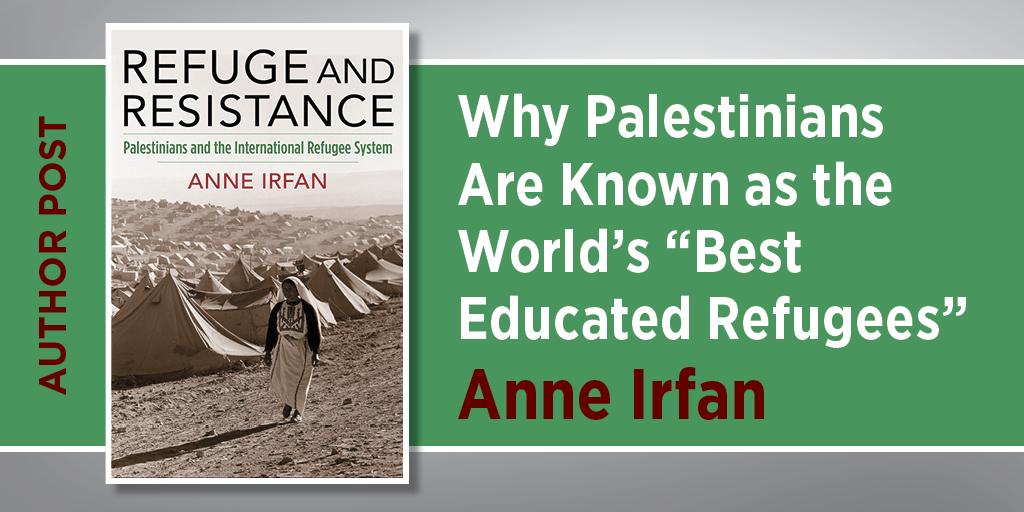Why Palestinians Are Known as the World’s “Best Educated Refugees”
Anne Irfan

In September 2018, a report from the Palestinian Central Bureau of Statistics found that Palestinians have one of the highest literacy rates in the world. The finding chimed with the Palestinians’ long-running reputation as the world’s “best-educated refugees” – a claim often made by international organizations as well as regional actors. Particularly but not exclusively in the Middle East, Palestinians have long had a reputation as high-performing graduates, often proficient in at least two languages, and frequently going on to pursue successful careers in engineering, business, or medicine. At the same time, the Palestinians are the world’s largest refugee population, with the longest-running case of protracted displacement. How did it happen, then, that a large-scale refugee population, many of whom survived for decades in refugee camps, became so highly educated?
Conventional wisdom cites the role of the relevant UN body: the Relief and Works Agency for Palestine Refugees in the Near East, better known by its acronym UNRWA. Active since 1950, UNRWA provides essential services to registered Palestine refugees in Syria, Lebanon, Jordan, the West Bank, and the Gaza Strip, known as the “five fields” (it also provided services to Jewish refugees within Israel until 1952, when it ceased operations there at the request of the Israeli government). Since 1960, education has constituted UNRWA’s single biggest program in terms of investment, funding, and personnel; today the agency operates schools, vocational training centers, and teacher training institutes. It provides a full basic education to registered Palestine refugees across all five fields; in Lebanon it also runs secondary schools, on account of Palestinians’ exclusion from the country’s public services. Due to its comprehensive nature, UNRWA’s education program is often described as comparable to a national education system, with the obvious distinction that it operates across multiple countries.
The program has been lauded in its quality as well as its scale. At its zenith, UNRWA schooling was considered so outstanding that even Palestinians who were not registered refugees, and other nationalities, allegedly sought (unsuccessfully) to enroll their children. The success of the education program had knock-on effects for the Palestinian diaspora, as its high quality enabled some UNRWA school graduates to secure scholarships for higher education and then pursue successful careers elsewhere. In the second half of the twentieth century, many moved to Kuwait and elsewhere in the Gulf, where they used their education to work successfully as engineers and businessmen. For a time, remittances from these refugees became an important source of income for Palestinians in the Levantine camps. While that particular phenomenon came to an abrupt end when Kuwait expelled all Palestinian residents in 1990–91, the latter retained their reputation as a highly educated group. To this day, UNRWA contends that its students are “among the most highly educated in the region.”
Due to its comprehensive nature, UNRWA’s education program is often described as comparable to a national education system, with the obvious distinction that it operates across multiple countries.
Yet as I show in my book Refuge and Resistance: Palestinians and the International Refugee System, the origins of education for Palestinian refugees can be found not with UNRWA but with the refugees themselves. In fact, the first refugee schools were set up at the very beginning of the Palestinian refugee crisis, before UNRWA had even been created. The establishment of the state of Israel in 1948 displaced and dispossessed more than 750,000 Palestinians, with large numbers left to survive in camps across the region. As well as seeking immediate shelter and food, the refugees quickly turned to the matter of education for their children in exile. Many camp refugees had been farmers in Palestine; having lost the land capital that had been their primary currency for generations, they now looked to education as an alternative form of social capital. They also saw it as a necessary tool for reversing their displacement and dispossession, with some concluding that higher education rates among the Jewish community in Palestine had given the latter an advantage over the Indigenous Palestinian population in 1948. The refugees thus quickly coalesced on education as a possible route out of their crisis, both individually and collectively.
Accordingly, from the late 1940s Palestinians worked to set up basic classes and even makeshift schools in the camps. Refugees who had been teachers in Palestine resumed their lessons in exile, finding ways to teach without books, pens, or furniture. They organized classes in tents, vacant shelters, or outside in the open air; some Palestinians in Gaza’s Maghazi camp even started lessons in an old kitchen. Some assistance came from local charities and international aid workers, most notably the American Friends Service Committee in Gaza and the Red Cross elsewhere, but the refugees themselves were the driving force behind these initiatives. Indeed at the beginning of 1950, the only refugee school operating in Jordan was one that had been set up by refugee teachers in Karama camp. When UNRWA began operations in May 1950, it took charge of these efforts, rather than starting its educational provision from scratch.
As well as seeking immediate shelter and food, the refugees quickly turned to the matter of education for their children in exile.
As I discuss at length in Refuge and Resistance, it was also the refugees who continuously pushed UNRWA to prioritize education and expand its schooling provision. In this they were ultimately successful. The number of UNRWA schools increased from 61 in 1950 to 386 in 1958. The agency’s expenditure on education rose from a third of its regular budget in the mid-1960s to more than half by the mid-1980s. Today, UNRWA spends 60 percent of its total program budget on education. It operates 706 schools, employs just under 20,000 education staff, and educates more than half a million refugee children. It can accurately be described as an organization primarily concerned with education—and this is due to the refugees’ campaigning over the years.
Palestinian refugee communities have also been some of the fiercest critics of the UNRWA education program. As students, parents, and teachers, they have continually lobbied for the program to meet their full set of socioeconomic and political needs as a displaced population. At times their activism has focused on educational content; UNRWA’s policy of using host state curricula meant that generations of Palestinian children grew up without learning about their own national history. More recently, refugee communities have been primarily concerned with cuts to the service. UNRWA’s deficit has repeatedly worsened in recent decades, made significantly worse by the Trump administration’s decision to defund the agency completely in 2018. As a result, its largest program has faced major cuts. The schools that were for many years the pride of the agency’s work now regularly run on double or even triple shifts, with large class sizes and insufficient resources. In 2015, UNRWA schools started the academic year late after a budget crisis prevented them from opening on time in September.
All this has served to undermine the program’s reputation, along with that of the Palestinians as the “world’s best-educated refugees.” At the same time, conditions in many Palestinian refugee camps have deteriorated because of continuing regional crises. Yet camp communities have remained steadfast in their focus on education as a key priority. At protests against UNRWA schooling cuts in recent years, refugees have held signs declaring “education is a red line” and “education is my life, so don’t kill me.” Palestinians refugees are thus determined to remain highly educated—and this determination is key to explaining how they became the world’s “best-educated refugees” in the first place.
Anne Irfan is lecturer in interdisciplinary race, gender, and postcolonial studies at University College London and the author of Refuge and Resistance: Palestinians and the International Refugee System.





